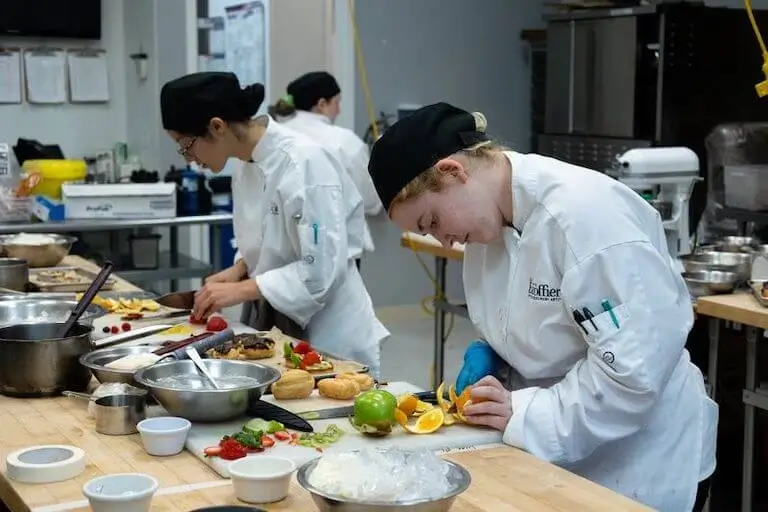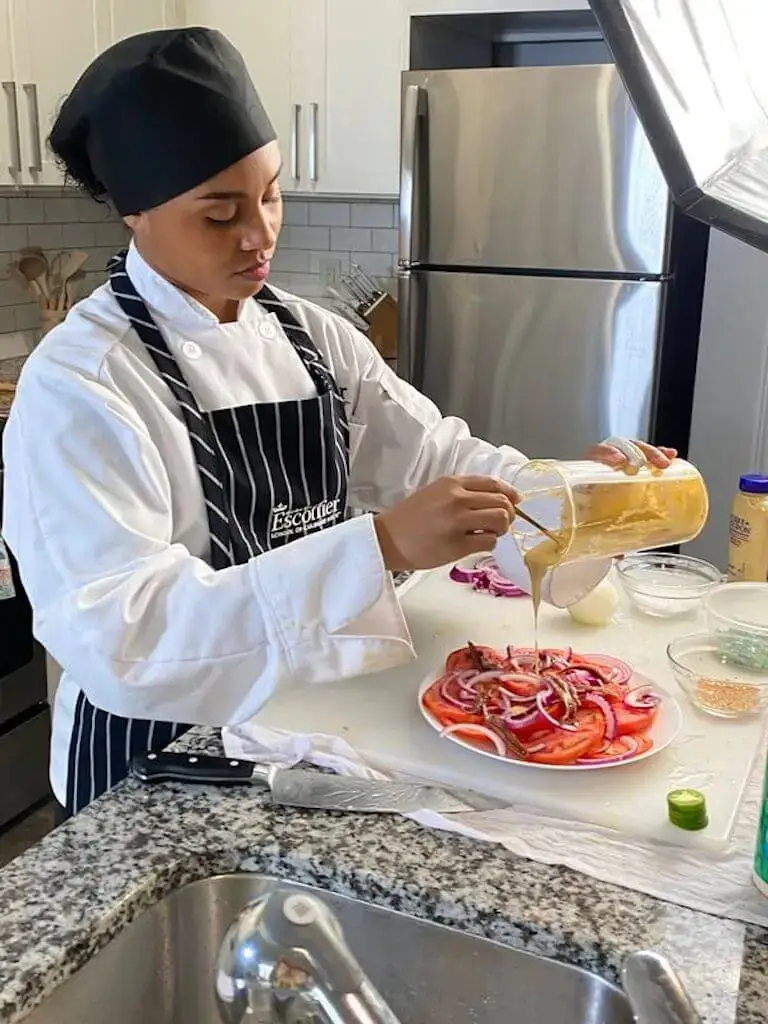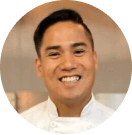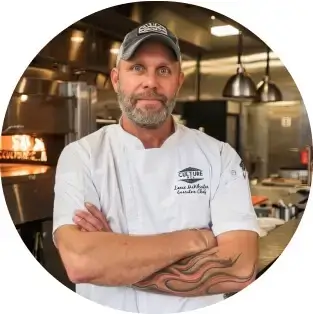Listen to This Article:
When you’re planning a career in the culinary industry, one of the first questions is how long it can take you to land that first job. The answer depends on the path you choose and the role you’re aiming for, but setting realistic expectations early on can make your transition smoother.
At Auguste Escoffier School of Culinary Arts, programs range from 30 to 84 weeks, and many students step into new roles soon after graduation—sometimes with the very business where they completed their externship.*
Let’s break down the actual timelines, explain what you can expect, and show you how real people made it work.
*Information may not reflect every student’s experience. Results and outcomes may be based on several factors, such as geographical region or previous experience.
Finding the Right Pace: Program Timeline Options
Escoffier designed their programs around how people actually live. Some folks can drop everything and go to school full-time, while others need to keep a paycheck coming in. Both approaches can work.
The choice generally boils down to your preferred pace: an intensive program completed more quickly, or one that offers added flexibility over time. On-campus programs at Boulder, CO and Austin, TX can finish faster, but you’ll need to treat school like a full-time job. Online programs may take longer, but they could make it easier to keep working while you study. In either scenario, you’ll also complete a hands-on industry externship.

On campus, Escoffier students develop culinary skills through hands-on practice in state-of-the-art campus kitchens.
On-Campus Programs (Austin & Boulder)
These are your best bets if you can swing full-time study and prefer an in-person experience:
Diploma Programs (30 weeks)
- Culinary Arts: 760 clock hours, externship included
- Pastry Arts: 760 clock hours, externship included
- Around 25 hours weekly in class and lab**
- You’re fully immersed. Instant connections with classmates and instructors.
- Shortest path to an externship—and maybe your first job offer
Plant-Based Cuisine Diploma (Boulder only, 42 weeks)
- 880 clock hours with externship
- About 25 hours per week in class**
- 8 to 15 hours per week for work outside of class
Associate Degrees (60 weeks)
- 1,340 clock hours including two externships
- Focus on business and management
- Around 25 hours weekly in class**
- 5 to 10 hours per week for work outside of class
- Two externships mean double the networking and double the potential job connections.
**Hours per week recommended for academics and school-related activities, depending on the student’s learning style.
Escoffier offers the following degrees:
Associate of Applied Science Degree in Culinary Arts (Austin Campus)
Associate of Applied Science Degree in Pastry Arts (Austin Campus)
Associate of Occupational Studies Degree in Culinary Arts (Boulder Campus & Online)
Associate of Occupational Studies Degree in Baking and Pastry (Boulder Campus & Online)
Associate of Occupational Studies Degree in Hospitality & Restaurant Operations Management (Online)
Associate of Occupational Studies Degree in Plant-Based Culinary Arts (Online)
Associate of Occupational Studies Degree in Holistic Nutrition and Wellness (Online)
Associate of Occupational Studies Degree in Food Entrepreneurship (Online)
Online Programs
Built for flexibility:
Online Diplomas (60 weeks)
- 15-23 hours per week on school-related activities, depending on program, credential, and personal pace
- Fully online coursework with hands-on industry externship
- Choose from Culinary Arts & Operations, Professional Pastry Arts, Plant-Based Culinary Arts, Holistic Nutrition and Wellness, or Food Entrepreneurship
- Keep earning while you’re studying
- Tons of students work in food service while they’re in school. It’s like getting a head start on experience.
Online Associate of Occupational Studies Degrees (60-84 weeks)
- Culinary Arts, Baking & Pastry, Hospitality & Restaurant Operations Management: 60 weeks
- Plant-Based Culinary Arts, Holistic Nutrition and Wellness, or Food Entrepreneurship: 84 weeks
- Same weekly time as the diploma programs
- Most thorough option if you want business and management preparation
Flexible Options for Faster Completion
A few things might actually speed up your timeline:
- Transfer Credits: Up to 75% of program credits can come from eligible transfer or proficiency credits for qualifying students. This could cut down your total time significantly. Note: All transcripts are reviewed individually. Our Transfer Credit Policy is published in our catalog, which can be found here.
- Existing Job Externships: With approval, you might complete your externship where you already work. No transition period needed.
- Rolling Start Dates: New programs start multiple times per year.
*Information may not reflect every student’s experience. Results and outcomes may be based on several factors, such as geographical region or previous experience.
Working While You Study
One of the biggest advantages of Escoffier’s online programs can be the flexibility to keep working while building or expanding upon your culinary skills. Approximately 15-23 hours per week is spent on school related activities depending on program, credential and personal pace. The hours per week time commitment for online students is designed to fit around work schedules.
“The online program worked best for me because I could do my full-time job and be a full-time student,” said Cassie Wallace, Escoffier Online Baking & Pastry Graduate. “It was easy because it was flexible. I took off, spread my wings, and never looked back.”*
*Information may not reflect every student’s experience. Results and outcomes may be based on several factors, such as geographical region or previous experience.

Online program students can practice culinary skills at home while maintaining their work schedules
What Does It Mean to Be “Job-Ready”?
Graduating from culinary school doesn’t mean you’ll walk into an executive chef position. Some graduates do start higher up in the kitchen brigade, but in most professional kitchens, they usually need to start in entry-level spots:
- Line cook or prep cook
- Pastry assistant or baker
- Kitchen assistant
- Catering assistant
Even with your diploma or degree, you need time to develop speed, consistency, and muscle memory.
Understanding the Kitchen Brigade
Chef Georges Auguste Escoffier created the kitchen brigade system to establish specific roles and responsibilities and ensure professional kitchens ran smoothly and efficiently.
Beginning your culinary career
- Prep Cook/Commis: You’re using your knife skills, preparing ingredients, and learning kitchen fundamentals
- Line Cook: You manage your own station—whether that’s the grill, salad prep, or sauce production
Advancing into leadership roles
- Senior Line Cook/Chef de Partie: You oversee an entire station and mentor newer team members
- Sous Chef: As the head chef’s second-in-command, you help manage daily kitchen operations
Leading the kitchen
- Head Chef/Executive Chef: You oversee the entire kitchen, develop menus, manage staff, and handle business operations
*Information may not reflect every student’s experience. Results and outcomes may be based on several factors, such as geographical region or previous experience.
Your Timeline from Start to First Paycheck
Here’s how things typically progress in different programs:
| Program Type | Total Length | Weekly Hours | Earliest Job Search After Starting School | Example Graduate Path |
|---|---|---|---|---|
| On-Campus Diploma | 30 weeks | ~25 hours | 7 months after start | Cassie Wallace landed a cake decorator job within a week of graduation |
| Online Diploma | 60 weeks | 15-23 hours | 15 months after start | While still in school, Tiffany Moore started catering for a family business she co-founded, and after graduation earned several grants to help fund her dream of opening a restaurant |
| On-Campus Associate | 60 weeks | ~25 hours | 15 months after start | Connor Fowler laid the groundwork for his sommelier career during his externship, then secured a job at the renowned Rootstock restaurant months after graduating |
| Online Associate | 60-84 weeks | 15-23 hours | 15-21 months after start | Multiple externships = more networking opportunities |
Program durations are minimums; actual times may vary based on student pace, course sequencing, transfer credits, and other factors.
*Information may not reflect every student’s experience. Results and outcomes may be based on several factors, such as geographical region or previous experience.
The Externship Advantage
Every Escoffier program includes at least one hands-on industry externship in a professional kitchen or food business.
“The externship class allows students—even those with no prior experience—to get their foot in the door,” said Vicki Berger, Hospitality & Restaurant Operations Management Chef Instructor. “Once they gain that valuable experience, it is easier for them to determine which path they want to take with their careers.”
Some Escoffier students can receive job offers directly from their externship. Others have used the experience and recommendations to land jobs soon after graduation. Your externship could take place in a restaurant, hotel, bakery, catering company, or your current place of employment, with prior approval.
Chris McAdams, a Culinary Arts graduate, used networking opportunities during his time at Escoffier to land consulting roles in R&D instead of traditional kitchen positions. His path shows how the connections you make can open doors you might not have even considered.*
*Information may not reflect every student’s experience. Results and outcomes may be based on several factors, such as geographical region or previous experience.
Real Graduate Timelines: The Fast, the Steady, and the Strategic
Let’s look at how actual graduates made their transitions:
The Fast Track: Cassie Wallace, Baking & Pastry Arts Graduate
Cassie finished her externship at The Mixing Bowl Bakery and got a stellar recommendation. She landed a full-time cake decorator job at Richmond’s Shyndigz bakery within a week of graduation. Seven months later, she was promoted to shift lead.
Cassie Wallace shares her Escoffier experience.
The Strategic Builder: Tiffany Moore, Online Culinary Arts Graduate
After overcoming serious medical challenges, Tiffany used her Escoffier training to help her family’s catering business, including improving her pricing. Then she secured major seed funding for her upcoming Atlanta restaurant, Lola Pecan. Her path combined immediate income through catering with longer-term business building.
The Dream Job Route: Jane Dodson, Culinary Arts Graduate
Jane’s dream job was to be a chef on a Disney cruise line. When she learned she needed a culinary arts degree to make it happen, she enrolled at Escoffier. Then she worked with Career Services to secure an externship with The Disney Culinary Program.
The Steady Climber: Brent Unruh, Associate Degree in Culinary Arts, Boulder Campus
Brent’s experience shows how an Escoffier education could consistently open doors.
“Every time I’ve gone from one place to another, my pay has increased, and I’ve never had a problem getting a job,” Brent said. “I take a copy of my degree and certifications. I’ve actually gotten jobs where I didn’t have to fill out an application. They just put me to work right away.”*
*Information may not reflect every student’s experience. Results and outcomes may be based on several factors, such as geographical region or previous experience.
Industries That Often Hire Quickly
Where can you find work fast? Some places seem to always be hiring, especially if you’ve got solid training.
Places That Hire Quickly:
- Restaurants: Whether fine dining or fast-casual, they need line cooks, prep cooks, and kitchen managers consistently
- Bakeries and Patisseries: Morning shifts, evening shifts, weekend work—there’s regular demand
- Hotels and Resorts: Big hotel chains often recruit from externship programs.
From Escoffier to the World’s Finest Hotels
Graduates have gone on to work with some of the world’s leading hotel and resort brands, including Disney, Hyatt, Fairmont, Ritz-Carlton, Four Seasons, and Omni. These partnerships reflect the high standards and professionalism that Escoffier students bring to the global hospitality industry.
- Catering Companies: Ideal for getting your feet wet or starting your own side business
- Food Trucks and Your Own Business: Some people jump right into entrepreneurship. Others get experience first, then branch out.

Starting your own food truck is one entrepreneurial path Escoffier graduates may pursue after gaining culinary skills
Takes a Bit Longer:
- Corporate Food Service: Think hospitals, schools, big office buildings. The pay can be great, but their hiring process moves slower
- Cruise Lines: Super competitive, but if you get in, you can advance quickly
Escoffier Grads Cooking for Global Brands
Escoffier graduates have built careers with some of the most recognized names in corporate and large-scale food service, including Sodexo Aramark, Compass Group, Disney Culinary, and Landry’s, Inc. These organizations offer diverse opportunities—from corporate dining and education to cruise ships and entertainment venues—where some Escoffier alumni have applied their skills on a global stage.
What Could Speed Up (or Slow Down) Your Timeline
Getting from student to paycheck isn’t just about finishing your classes. There are things that may be able to help you land that first job faster. There are also things that might slow you down.
Academic Performance
Your academic success could directly impact your timeline to employment. Not attending classes regularly or missing assignments can impact your learning and can delay graduation.
Keep in mind that Escoffier students must finish all credits, complete the externship, and maintain a minimum 2.0 GPA throughout the program to graduate. Staying on track academically can help ensure you’ll be ready to enter the job market as planned.
Externship Experience
Your externship experience can play a huge role in your job prospects. Doing your best work and making a strong connection with your host site can open doors to job opportunities right away.
On the flip side, not giving your best effort during your externship can limit the connections and references you may need when job hunting.
Networking and Relationships
Building relationships throughout your journey matters too. Connect with classmates, Chef Instructors, and others in the industry. This network can lead to job referrals down the road. Your Chef Instructors bring years of industry experience and may maintain connections with local restaurants, hotels, and food businesses, which could benefit your job search.
Other students may also become valuable contacts as they move into different segments of the culinary industry. Don’t overlook the power that your externship supervisor’s recommendation could bring, either. Their endorsement can carry significant weight with potential employers.
Location and Flexibility
Location can matter when it comes to finding work quickly. Living in an area with fewer culinary opportunities may require you to relocate or expand your job search, which could slow down your timeline.
Your attitude also makes a difference. Being open to different locations or types of restaurants can expand your opportunities significantly, and having a willingness to start at the bottom and work your way up can show employers that you’re serious about building your career.
Making the Most of Your Escoffier Experience
How fast you transition into professional cooking often comes down to your approach. The students who do best are usually the ones who build relationships, look for opportunities, and think strategically about their future from day one.
How fast your career launches often comes down to how you approach your education:
During Your Time at School
Take full advantage of Career Services throughout your program. They can help polish your resume and develop job search strategies that actually work. Don’t overlook the value of networking with your Chef Instructors, either. They have industry connections and real-world experience that can benefit your career.
Your externship deserves your absolute best effort. It’s often your strongest job lead and your chance to prove yourself in a professional kitchen. Many students land their first positions through externship connections*.
The Alumni Association offers another powerful resource with more than 10,000 members. Connect with graduates who can provide mentorship and share job opportunities in your area of interest.
*Information may not reflect every student’s experience. Results and outcomes may be based on several factors, such as geographical region or previous experience.
After You Graduate
Be realistic about starting positions while staying ambitious about your long-term growth. Most culinary careers begin with entry-level roles, but remember, that’s just the starting point.
Your Escoffier network remains valuable throughout your career. Use these connections for job leads and professional references when you’re ready to make your next move.
Consider working at different types of places to find the right fit for your skills and interests. Fine dining, casual restaurants, catering companies, and corporate and institutional kitchens all offer different experiences and growth opportunities.
Remember that Career Services support doesn’t end at graduation. They’re there to help you navigate career transitions and advancement throughout your professional journey.
Your First Step
The culinary industry needs skilled, trained professionals. The combination of hands-on training, externship experience, and ongoing career support at Escoffier can help prepare you to work toward hitting your career goals.
Ready to explore how an Escoffier education could fit into your timeline? Contact our admissions team to discuss which program might work best for your situation and goals.




